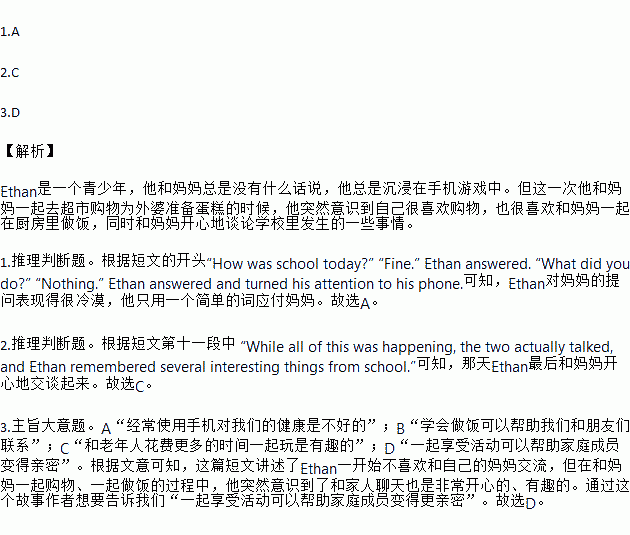题目内容
“How was school today?” Ethan's mom asked as he climbed into the car.
“Fine.” Ethan answered.
“What did you do?” she tried to start a conversation.
“Nothing.” Ethan answered and turned his attention to his phone.
Ethan's mom sighed(叹气). “Your grandmother and I used to have actual conversations.”
“Huh?” Ethan wasn't really listening.
“Nothing,” his mother said.
Ten minutes later, Ethan finally looked up from his phone. What are we doing here? He asked, noticing they were at an unknown supermarket.
“Grandma is coming over for dinner tonight and we need to buy something for her favorite strawberry cheesecake. I thought you could help me make it.”
Ethan hated shopping, and he would play his favorite video game rather than bake for a whole afternoon. However, he knew his grandmother would love the cheesecake, so he agreed unwillingly(不情愿地).
Surprisingly, Ethan realized that he enjoyed shopping and he was also having fun in the kitchen helping his mom after they got home. While all of this was happening, the two actually talked,and Ethan remembered several interesting things from school.
It was great to see his grandmother again at dinner too. The last time they met was several weeks ago. and he realized that he had a lot to tell her.
“Wow, Ethan, I don't think I've heard you speak this much in a long time,” Ethan's mom smiled.
“Well, when you were Ethan's age, Norah”, Ethan's grandmother said gently to his mother, you used to spend your whole life in your room!”
Ethan's mother turned pink. “That's not true, mom!”
“In fact,” Ethan's grandmother winked(眨眼) at Ethan, “I had to get her to help me make this very cheesecake to even get her to talk to me.”
From the other side of the room, Ethan's phone rang. But Ethan realized that this conversation with his mother and grandmother was much more interesting.
1.At first. Ethan was___________when his mom asked about his school life.
A.cold B.happy C.nervous D.sad
2.What can we learn from the passage?
A.Ethan had an unpleasant day at school that day.
B.Ethan expected to go shopping on his way home.
C.Ethan started real conversations with his family at last.
D.Ethan often made strawberry cheesecake with his grandma.
3.What does the writer want to tell us?
A.Using cell phones too often is not good for our health.
B.Learning to cook can help us keep in touch with friends.
C.Spending more time playing with elders can be interesting.
D.Enjoying activities together can help family members become closer.


